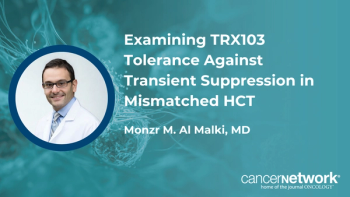
- ONCOLOGY® Companion, Volume 38, Supplement 8
- Volume 38
- Issue 8
- Pages: 8
Evaluating the Use of CAR T-Cell Therapy for Multiple Myeloma in Academic and Community Settings
Strategies for treating patients with multiple myeloma who are eligible to receive CAR T-cell therapy in either community or academic practices were discussed in a recent Training Academy.
In a recent Training Academy program hosted by CancerNetwork®, a panel of experts in multiple myeloma highlighted treatment strategies for patients who are eligible to receive chimeric antigen receptor (CAR) T-cell therapy and described critical processes associated with patients transitioning between community practices and academic centers. The panel discussed topics ranging from optimally timing leukapheresis to monitoring patients for neurotoxicity throughout the treatment course. Here are their key takeaways:
Determining Suitable Conditions for CAR T-Cell Therapy
- The role of the immune system in anticancer therapy has become more widely acknowledged, making conversations with patients about eligibility for CAR T-cell therapy easier.
- CAR T-cell therapy may not be as effective in those with high-risk genetics; age may also influence efficacy.
- Community oncologists may share treatment decision-making with their colleagues in academic centers.
- Some patients may prefer to receive close monitoring in a community setting while undergoing bridging therapy.
- Transportation issues may also make treatment in a community setting more suitable.
- Deferring to academic colleagues may be suitable in the case of aggressive early-line disease.
Administering CAR T Cells at Academic Centers
- Triaging patients for potential CAR T-cell therapy at academic centers is dependent on the extent of their disease relapse.
- Patients with standard-risk disease may receive several triplet therapy options.
- Patients with functionally high-risk disease and quick relapses may be prioritized for CAR T-cell therapy.
- Patients who receive CAR T-cell therapy may be able to return to community centers soon following the window for cytokine release syndrome or immune effector cell–associated neurotoxicity syndrome.
- Patients may return as soon as 4 weeks following infusion if their counts have adequately recovered.
- Count recovery following CAR T-cell therapy, however, may take as long as 3 months.
Monitoring Neurotoxicity and Ensuring Treatment Access
- It may be necessary to develop a systematic approach to monitor for potential neurotoxicity such as parkinsonism.
- Academic oncologists can educate their community colleagues about these adverse effects.
- Patients should also be educated on potential signs of toxicity.
- Ensuring that patients can access CAR T-cell therapy is an ongoing challenge.
- Academic practices may offer housing options on campus for patients.
- Having conversations with insurance providers may also financially assist with having patients in proximity to a treatment center.
Articles in this issue
Newsletter
Stay up to date on recent advances in the multidisciplinary approach to cancer.










































